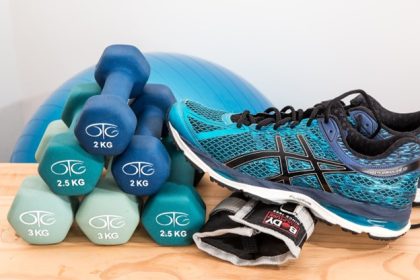Strength Training May Improve Mental Health

WASHINGTON — Do you generally feel good after exercise? It has been well-documented that getting regular physical activity may improve mental health and help decrease symptoms of depression and anxiety, but how does it work? Most research focuses on how cardio exercise impacts mental health. Less examined is the role of resistance (or strength) exercise.
A study published in March 2024 details the potential evidence of what strength training does to your brain and body, and how it may help treat depression and anxiety. Here, we’ll explain what the researchers found and provide more information on strength training and mental health.
Resistance Training as Therapy Aid
Researchers at the University of Limerick in Ireland and Iowa State University recently published a study in the Trends in Molecular Medicine Journal on how resistance training can be an alternative (or supplemental) therapy to treating symptoms of anxiety and depression.
They define resistance training as a muscle-strengthening exercise where you exert force against a load such as your body weight, a resistance band, a hand-held weight like a dumbbell or kettlebell, or a weight machine, to generate a training response.
Health guidelines recommend doing resistance exercise regularly — at least two sets of eight to 12 repetitions of exercises for all your major muscle groups, at least twice a week, and progressing the intensity and difficulty over time.
Regularly doing so is referred to as RET (resistance exercise training). The physical and mental health benefits come from the accumulation of work over weeks and months, not a single session (though you’ll probably still feel it right afterward).
How it Works
It is well-known that RET works on your musculoskeletal system to strengthen muscles and bones and improve mobility, balance, and joint health. The study highlights how RET affects your brain and outlines four potential ways that it helps decrease symptoms of depression and anxiety.
It all comes down to neuroplasticity — the idea that you can change the structure and function of your brain, causing your nervous system to adapt. Neuroplasticity can cause harmful changes if you suffer a brain injury or stroke, but you can also experience positive brain changes from RET.
- Releases IGF-1 Hormone: Many studies suggest that RET releases the hormone IGF-1. While it’s typically associated with helping to increase strength and muscle, the new research states it may also improve mood and contribute to neuroplasticity.
- Stimulates Monoamine System: You may have heard that exercise releases endorphins which make you feel good — this is now known as the endorphin hypothesis and may not be correct. Instead, exercise may release other neurotransmitters known as monoamines, which include dopamine, noradrenaline and serotonin. Previous studies suggest cardio exercise releases monoamines, but this study adds that RET may work the same way, and also release norepinephrine.
- Cerebrovascular Adaptations: The reasons why people have depression and anxiety are poorly understood. The “vascular depression” hypothesis states that people with depression may have poor blood flow. The study suggests that RET improves blood flow throughout the body and brain, so RET may help decrease symptoms of depression.
- Controlled Breathing: Research suggests that controlled breathing can benefit mental health by reducing stress and anxiety symptoms. It can also help regulate blood pressure and heart rate. Controlling your breath is key in resistance training. You generally inhale during the eccentric part of an exercise. when the muscles lengthen, and exhale during the concentric part, when the muscles contract. Doing this over time adds up, so the study suggests breathing like this during regular RET may offer the same benefits as doing it independently of exercise.
Other Research
Many previous studies have found that participating in regular RET can reduce symptoms of anxiety and depression in people of all ages and genders, with and without chronic health conditions. Here are a few to check out.
- Young Adults: RET reduces depression symptoms in young adults. In another study, it reduced symptoms of depression and anxiety in young adults.
- Older Adults: RET reduces depression and improves cognitive function in older adults and older women.
- Fibromyalgia: RET reduces symptoms of depression in people with fibromyalgia.
- Mental Health Conditions: Two studies examined the effects of RET on people with and without mental health conditions — both improved symptoms in all participants.
- COVID-19: A study published in 2022 investigated the effects of exercise on mental health during the COVID-19 pandemic. People who did aerobic exercise had less depression and anxiety than those who did RET. Those who did both types of exercise had a better self-perception of health.
Mental Strength
If you have depression or anxiety, it’s important to seek professional guidance or call 988 in an emergency. Research has shown that regular exercise is a helpful addition to therapy and medication. The new study found it may be due to positive changes in your brain but also adds that there still needs to be more research to further understand this topic.
Strength training may also improve self-esteem as you see yourself progressing and getting physically stronger. It also helps you develop a mind-body connection as you focus on feeling your muscles and breathing in each movement.
Our website content, services and products are for informational purposes only. The Well News does not provide medical advice, diagnosis or treatment. If you have medical concerns or questions, discuss with your health care professional.
You can reach us at [email protected] and follow us on Facebook and X (formerly known as Twitter)

























